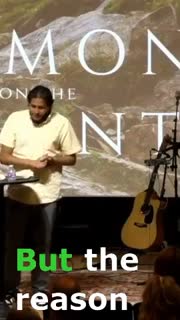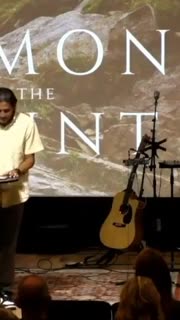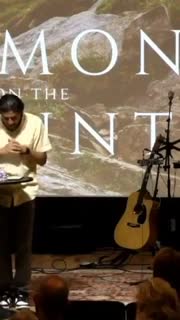Building a Genuine Faith on Solid Foundations
Devotional
Sermon Summary
Bible Study Guide
Sermon Clips
### Quotes for Outreach
1. "But the reason I'm sharing this story is because the same thing could be said about... People that profess to be believers and people that profess to be Christians but have nothing to back it up. You know, we can boast about our church and how wonderful and perfect our church is. But if we don't have the love, we're not a welcoming church or we're not following what Jesus is asking us to do, then, I mean... It means nothing. And it's just that. Just something that we say." (42 seconds)
2. "But that alone doesn't get us into the kingdom of heaven. That alone is not enough. And on the flip side, we can confess or profess to be believers of Jesus but not practice any of the teachings of Jesus and instead live a life just as we want and let the world corrupt us. And that also will not get us into heaven." (30 seconds)
3. "See, nowadays it's so easy to just show how good we are. We can post videos and photos or live reels about all the good works we are doing. You know, we can post about going to third world countries and doing humanitarian work. Or going to the homeless and serving food. Or building a well in a remote area and bringing clean water to impoverished communities. Which that is all really good, by the way. We should be doing all that." (32 seconds)
4. "See, I believe that as people, we really need to look inward and constantly look at ourselves and evaluate, where are we? Where am I? Where's my heart? We can fool ourselves and say, you know, I'm a believer, and I do this, and I do that. And we can play the church game. But it's not until COVID hits, it's not until crazy storm hits that really our hearts are revealed." (37 seconds)
5. "See, I think gathering together, having services, having fellowship, either if you prefer a big church, small church, obviously we prefer church. But if you prefer a big church, small church, or if you prefer a small church, otherwise you wouldn't be here. But yeah, wherever it is that you want to be, it is really important for us to just value us gathering together, coming here and listening to the word and worshiping or having a meal together. Wherever you are, it is important for us to walk together." (35 seconds)
### Quotes for Members
1. "See, what COVID did is just expose where we were. And still today, we know of a lot of congregations that are still struggling to get back up. There's still a lot of buildings that are, you know, massive buildings, and they're empty. And some buildings, some ministries are struggling to just keep up with the building demands because the congregation took a hit. And really just expose who's really following it. And until today, we still have lots, lots of people that have not come back to the church. They just said, we're done. We're done with the church." (35 seconds)
2. "See, our Bible literacy in the church is so low. It's at a highest low. And this is not, I'm not trying to offend anybody here. I'm not trying to be like, man, maybe Melvin came and was really legalistic this morning. Not at all. Really just highlighting where we are as a big C, because this is, this is, research has been done all over. Our Bible literacy in church is really, really low. And that is concerning. And then we wonder, why, why, why are we declining? What's going on? I think we need to get back to loving the word, being passionate for the word." (50 seconds)
3. "See, there's times in our lives where we get to this, in our spiritual journey, we get to this place where we like, we hit a wall. And we are probably, you get to a point where you're like, not as excited coming Sunday morning and just hearing the sermon. And you come out of this place like, man, that sermon was good. I'm on fire. I'm about to tell 10 people about what I just heard this morning. Maybe you're not there. Maybe you were that when you started. You know, just on fire. Just like, man, everything that was going on at church, you're like, man, that was so good." (35 seconds)
4. "See, Jesus, he already knows that everything that he had just said up until this point, it was going to be hard for people to hear. It was going to be hard for people to really swallow. And even to today, we have many theologians that will argue that the Sermon on the Mount is not something that we realistically can actually live. But see, Jesus is also assuming that we are going to be lustful people, that we are going to want to get divorced, that we are going to be people that are going to love money and be greed and want to say mean things to people. He's assuming all of that. And that's why he's calling us to a life of practice." (45 seconds)
5. "And I really, I just really think we need to return to the basics of the gospel. I've been reading a book called Practice in the Way, by Mark Comer. And basically, the three things he says is we need to be like Jesus, or be with Jesus, sorry, be like Jesus, and do the things he did, practicing the way. See, there's nothing new that I'm going to say this morning, not a new discovery, nothing you haven't heard before. I believe that we really need to return to a life of prayer." (40 seconds)
Ask a question about this sermon
1. "But the reason I'm sharing this story is because the same thing could be said about... People that profess to be believers and people that profess to be Christians but have nothing to back it up. You know, we can boast about our church and how wonderful and perfect our church is. But if we don't have the love, we're not a welcoming church or we're not following what Jesus is asking us to do, then, I mean... It means nothing. And it's just that. Just something that we say." (42 seconds)
2. "But that alone doesn't get us into the kingdom of heaven. That alone is not enough. And on the flip side, we can confess or profess to be believers of Jesus but not practice any of the teachings of Jesus and instead live a life just as we want and let the world corrupt us. And that also will not get us into heaven." (30 seconds)
3. "See, nowadays it's so easy to just show how good we are. We can post videos and photos or live reels about all the good works we are doing. You know, we can post about going to third world countries and doing humanitarian work. Or going to the homeless and serving food. Or building a well in a remote area and bringing clean water to impoverished communities. Which that is all really good, by the way. We should be doing all that." (32 seconds)
4. "See, I believe that as people, we really need to look inward and constantly look at ourselves and evaluate, where are we? Where am I? Where's my heart? We can fool ourselves and say, you know, I'm a believer, and I do this, and I do that. And we can play the church game. But it's not until COVID hits, it's not until crazy storm hits that really our hearts are revealed." (37 seconds)
5. "See, I think gathering together, having services, having fellowship, either if you prefer a big church, small church, obviously we prefer church. But if you prefer a big church, small church, or if you prefer a small church, otherwise you wouldn't be here. But yeah, wherever it is that you want to be, it is really important for us to just value us gathering together, coming here and listening to the word and worshiping or having a meal together. Wherever you are, it is important for us to walk together." (35 seconds)
### Quotes for Members
1. "See, what COVID did is just expose where we were. And still today, we know of a lot of congregations that are still struggling to get back up. There's still a lot of buildings that are, you know, massive buildings, and they're empty. And some buildings, some ministries are struggling to just keep up with the building demands because the congregation took a hit. And really just expose who's really following it. And until today, we still have lots, lots of people that have not come back to the church. They just said, we're done. We're done with the church." (35 seconds)
2. "See, our Bible literacy in the church is so low. It's at a highest low. And this is not, I'm not trying to offend anybody here. I'm not trying to be like, man, maybe Melvin came and was really legalistic this morning. Not at all. Really just highlighting where we are as a big C, because this is, this is, research has been done all over. Our Bible literacy in church is really, really low. And that is concerning. And then we wonder, why, why, why are we declining? What's going on? I think we need to get back to loving the word, being passionate for the word." (50 seconds)
3. "See, there's times in our lives where we get to this, in our spiritual journey, we get to this place where we like, we hit a wall. And we are probably, you get to a point where you're like, not as excited coming Sunday morning and just hearing the sermon. And you come out of this place like, man, that sermon was good. I'm on fire. I'm about to tell 10 people about what I just heard this morning. Maybe you're not there. Maybe you were that when you started. You know, just on fire. Just like, man, everything that was going on at church, you're like, man, that was so good." (35 seconds)
4. "See, Jesus, he already knows that everything that he had just said up until this point, it was going to be hard for people to hear. It was going to be hard for people to really swallow. And even to today, we have many theologians that will argue that the Sermon on the Mount is not something that we realistically can actually live. But see, Jesus is also assuming that we are going to be lustful people, that we are going to want to get divorced, that we are going to be people that are going to love money and be greed and want to say mean things to people. He's assuming all of that. And that's why he's calling us to a life of practice." (45 seconds)
5. "And I really, I just really think we need to return to the basics of the gospel. I've been reading a book called Practice in the Way, by Mark Comer. And basically, the three things he says is we need to be like Jesus, or be with Jesus, sorry, be like Jesus, and do the things he did, practicing the way. See, there's nothing new that I'm going to say this morning, not a new discovery, nothing you haven't heard before. I believe that we really need to return to a life of prayer." (40 seconds)










